| Srl | Item |
| 1 |
ID:
141776
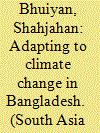

|
|
|
|
|
| Summary/Abstract |
Climate change poses a serious threat to humanity in developed and developing countries and is already affecting South Asia. This study examines the role that good governance plays for adapting to climate change in Bangladesh, arguing that lack of good governance in Bangladesh risks reducing adaptation preparedness to climate change in the country. There is evidence, mainly because of geophysical risk factors, to support arguments that good governance has anyway limited capacity in relation to adaptation measures to climate change in countries like Bangladesh. The article argues that the current politico-economic situation makes it doubtful whether Bangladesh will achieve the fullest possible ability to ensure good governance for better adaptation to climate change in the near future.
|
|
|
|
|
|
|
|
|
|
|
|
|
|
|
|
| 2 |
ID:
141777
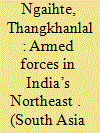

|
|
|
|
|
| Summary/Abstract |
More than 60 years of de facto military rule through the Armed Forces (Special Powers) Act (AFSPA) 1958 in India’s northeast has engendered neither stability nor peace. Problems regarding the impunity of violence and crime, official corruption and the virtual collapse of the rule of law continue, but the Act remains in operation. This article attempts to reframe the debates on the AFSPA in terms of its necessity by turning the necessity argument on its head and arguing that the secessionist insurgencies which were originally used to justify the Act have actually long ceased to exist. Since the principle of existential necessity that provided a fig leaf to the Act no longer applies, its continued application needs to be re-examined. It is further argued that the Indian military’s increasing clout in internal security policy-making may have grave implications for Indian democracy itself, with negative impacts on the rule of law and in relation to safe inclusion strategies for India’s northeast.
|
|
|
|
|
|
|
|
|
|
|
|
|
|
|
|
| 3 |
ID:
141775
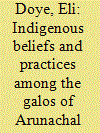

|
|
|
|
|
| Summary/Abstract |
This fieldwork-based article provides an ethnographic overview of surviving traditional ritual practices and underlying belief systems among the Galos of Arunachal Pradesh. Since most of this community recently converted to Christianity, many of the details outlined here may soon be forgotten and no longer practised, or will be only used when other patterns of recourse to remedies for distress have shown no results. The evidence presented indicates the continued presence of ancient holistic worldviews that may be dismissed by others as ‘primitive’ but whose followers seek to fall in line and clearly connect themselves with locally grounded forces beyond immediate human control.
|
|
|
|
|
|
|
|
|
|
|
|
|
|
|
|
| 4 |
ID:
141772
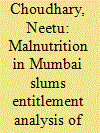

|
|
|
|
|
| Summary/Abstract |
Despite strong constitutional safeguards and promises, malnutrition persists in major Indian conurbations such as Mumbai and manifests as a group phenomenon concentrated in certain slum pockets that remain institutionally isolated. Based on a detailed study of four slums in Mumbai, this article uses the entitlement approach developed by Amartya Sen to examine how group identity affects group differentials in achievement of basic capabilities. Irrespective of similar initial endowments, some groups were found able to achieve upward mobility over time, whereas others remained constantly vulnerable. This may be because the access to various resources and the ability to translate them into functioning assets are mediated in various ways, depending on people’s multiple identities, which sometimes constitute barriers. The article concludes that to alleviate malnutrition, proactive state agency and public transfers are needed to enhance deprived groups’ prospects to build on their basic capabilities to improve their lives.
|
|
|
|
|
|
|
|
|
|
|
|
|
|
|
|
| 5 |
ID:
141774


|
|
|
|
|
| Summary/Abstract |
This article analyses how the post-9/11 fictional narratives of two Pakistani writers critique the racialisation of Islam in discourses of American homeland security, patriotism and national belonging after 9/11, which construct Muslims as terrorists and outsiders and disqualify them from US citizenship and belonging. More specifically, in light of many studies showing how Muslim youths increasingly adopt nationalist and religious identities after experiences of harassment following 9/11 and Islamophobia, the article assesses the identity crisis of Pakistani Muslim immigrant youth as depicted in The Reluctant Fundamentalist (Hamid, 2007) and Homeboy (Naqvi, 2010). We explore how these two authors show that these reactive identities are ideological constructs arising from highly diversified negotiations of the complex configuration of sociocultural and political factors in the post-9/11 world.
|
|
|
|
|
|
|
|
|
|
|
|
|
|
|
|
| 6 |
ID:
141773
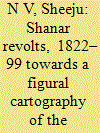

|
|
|
|
|
| Summary/Abstract |
This article focuses on the Shanar revolts, a series of subaltern uprisings in nineteenth-century South Travancore, for the right to wear upper clothes over the bosoms of Shanar women. In the parlance of official accounts and modern histories, these revolts are mere disturbances or controversies and the subaltern rebels in these struggles were always pretenders. Contrary to this, an attempt is made here to document and explicate the becoming of the pretender and to demonstrate that historiography may well be implicated, all too easily, in generating the very precarity of the pretender by opposing any movement towards reform.
|
|
|
|
|
|
|
|
|
|
|
|
|
|
|
|